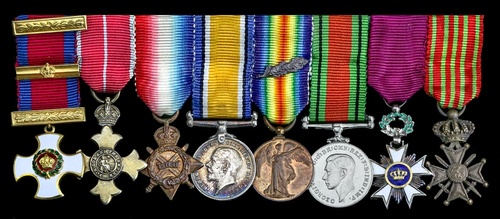
Auction: 18001 - Orders, Decorations and Medals
Lot: 392
(x) 'To lose the rank I have had the honour to bear adds heavily to the existing punishment for my offence.'
George Brighten, formerly an Acting Lieutenant-Colonel and the holder of the D.S.O. and Bar, writing from Wormwood Scrubbs in 1932.
The mounted group of eight miniature dress medals worn by Colonel G. S. Brighten, D.S.O., O.B.E., Home Guard, formerly a gallant Battalion C.O. of the 2/5th Lancashire Fusiliers
Distinguished Service Order, G.V.R., with Second Award Bar, gold, silver-gilt and enamel; The Most Excellent Order of the British Empire, (O.B.E.), Military Division, Officer's 2nd type badge; 1914-15 Star; British War and Victory Medals, M.I.D. oak leaf; Defence Medal 1939-45; Belgium, Order of the Crown, silver-gilt, silver and enamel; Belgium, Croix de Guerre, 'A' cypher, mounted as worn, good very fine (8)
George Stanley Brighten was born in May 1890 and educated at Falmouth and Haileybury. With the commencement of hostilities, he enlisted in the 20th Battalion, London Regiment, direct from his employment as a solicitor. Commissioned shortly after as a 2nd Lieutenant in the 1/8th Liverpool Regiment, he served on the Western Front from 12 May 1915. Clearly a talented leader, he rose to Lieutenant-Colonel and was considered to have displayed ' … still more brilliant leadership' than his predecessor, Lieutenant-Colonel B. Best-Dunkley, V.C., when he took command of the 2/5th Lancashire Fusiliers in August 1917 (British Infantry Commanders in the First World War, by P. E. Hodgkinson, refers). Evidence of that 'fighting' command may be found in the citations for his D.S.O. and Bar:
D.S.O. London Gazette 26 November 1917:
'For conspicuous gallantry and devotion to duty. When his battalion could advance no further owing to intense machine-gun fire, he went forward and personally reorganised it and established a strong defensive line. Later, when this hostile fire slackened, he at once initiated an advance which gained a considerable amount of ground. Throughout, his admirable reports were of the greatest assistance. His ability, coolness, and grasp of the situation had a marked effect on all ranks.'
D.S.O. Second Award Bar London Gazette 26 November 1917:
'For conspicuous gallantry and devotion to duty during an enemy attack. He was commanding the Battalion in reserve and employed it with such advantage that the attack was held up and the enemy repulsed with heavy loss, many prisoners being taken. His clever disposal of his forces and his fine example of coolness did much to restore the position.'
He held command through to the Armistice and was additionally twice decorated by the Belgians and thrice 'mentioned' (London Gazettes 15 June 1916, 18 December 1917 and 27 December 1918, refer).
Returning to civilian life was clearly a strain for the gallant Brighten, whose legal practice was struck off in April 1932. He was imprisoned for three years at the Old Bailey for fraud, including an embezzled cheque of large proportions.
Happily, he was able to return to favour in the Second World War, commanding 'K' District of the London Home Guard with distinction. He was advanced to Colonel and awarded the O.B.E. (London Gazette 15 December 1944, refers); he was killed in a motor accident on 4 October 1954; sold with copied research.
Subject to 5% tax on Hammer Price in addition to 20% VAT on Buyer’s Premium. For more information please view Terms and Conditions for Buyers.
Sold for
£210




